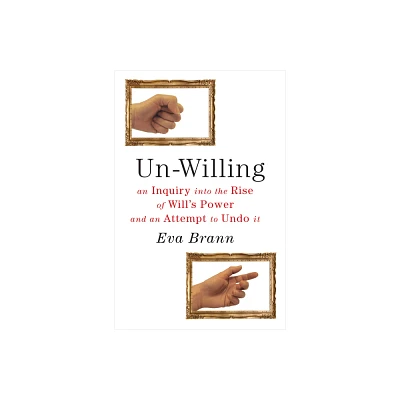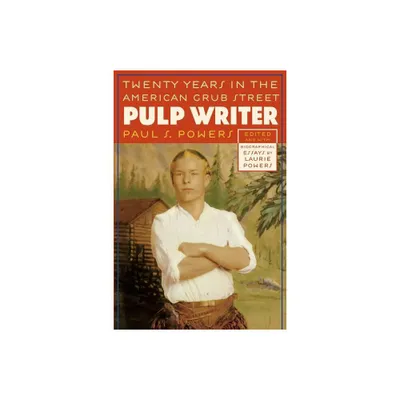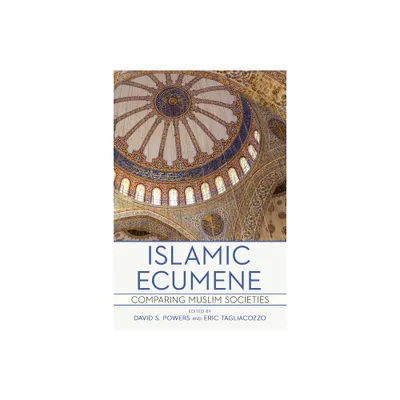Home
Un-Willing: An Inquiry into the Rise of Will¿s Power and an Attempt to Undo It
Loading Inventory...
Barnes and Noble
Un-Willing: An Inquiry into the Rise of Will¿s Power and an Attempt to Undo It
Current price: $35.00


Barnes and Noble
Un-Willing: An Inquiry into the Rise of Will¿s Power and an Attempt to Undo It
Current price: $35.00
Loading Inventory...
Size: OS
*Product Information may vary - to confirm product availability, pricing, and additional information please contact Barnes and Noble
Since ancient times, philosophers have written about "the will." But the will is more than a philosophic and scholarly topic. In our everyday speech, what do we mean when we speak of the "will"? Will-words turn up everywhere in the English language. We make
wills
. We exert our
willpower
. We are
willful
at times but merely willing at others. Above all, will is there a hundred times a day, when we use the auxiliary verb "will" to express our intentions or expectations for the future, or simply to indicate the future tense.
Yet it takes only a moment's reflection to see that there's a tremendous range of meaning here, and so something to think about. Moreover, all of us have wondered now and then, probably both as children and as adults, whether we are really free, and whether being free means being able to do what we want or being free of wants and desires or something else entirely. That is, we've all wrestled with the issue of free will in our informal, non-scholarly ways. Finally, we've probably all asked ourselves whether people who talk about will and willpower are all talking about the same thing or even talking sense.
These are all among the issues that Eva Brann puts at the center of
Un-Willing
. She takes the whole range of questions about the will that are implicit in our everyday lives and everyday thinking, articulates them, shows us how they have been dealt with within the philosophic tradition and contemporary scientific thoughtand then wrestles with them herself.
"Eva Brann has a true aptitude for felicitous expression, and one can feel through her prose the presence of a great and patient teacher."Dennis L. Sepper, University of Dallas, author of
Understanding Imagination
Eva Brann
is a member of the senior faculty at St. John's College in Annapolis, Maryland, where she has taught for fifty-seven years. She is a recipient of the National Humanities Medal. Her other books include
The Logos of Heraclitus
,
Feeling Our Feelings
Homage to Americans
Open Secrets / Inward Prospects
The Music of the Republic
, and
Homeric Moments
(all published by Paul Dry Books).
wills
. We exert our
willpower
. We are
willful
at times but merely willing at others. Above all, will is there a hundred times a day, when we use the auxiliary verb "will" to express our intentions or expectations for the future, or simply to indicate the future tense.
Yet it takes only a moment's reflection to see that there's a tremendous range of meaning here, and so something to think about. Moreover, all of us have wondered now and then, probably both as children and as adults, whether we are really free, and whether being free means being able to do what we want or being free of wants and desires or something else entirely. That is, we've all wrestled with the issue of free will in our informal, non-scholarly ways. Finally, we've probably all asked ourselves whether people who talk about will and willpower are all talking about the same thing or even talking sense.
These are all among the issues that Eva Brann puts at the center of
Un-Willing
. She takes the whole range of questions about the will that are implicit in our everyday lives and everyday thinking, articulates them, shows us how they have been dealt with within the philosophic tradition and contemporary scientific thoughtand then wrestles with them herself.
"Eva Brann has a true aptitude for felicitous expression, and one can feel through her prose the presence of a great and patient teacher."Dennis L. Sepper, University of Dallas, author of
Understanding Imagination
Eva Brann
is a member of the senior faculty at St. John's College in Annapolis, Maryland, where she has taught for fifty-seven years. She is a recipient of the National Humanities Medal. Her other books include
The Logos of Heraclitus
,
Feeling Our Feelings
Homage to Americans
Open Secrets / Inward Prospects
The Music of the Republic
, and
Homeric Moments
(all published by Paul Dry Books).













